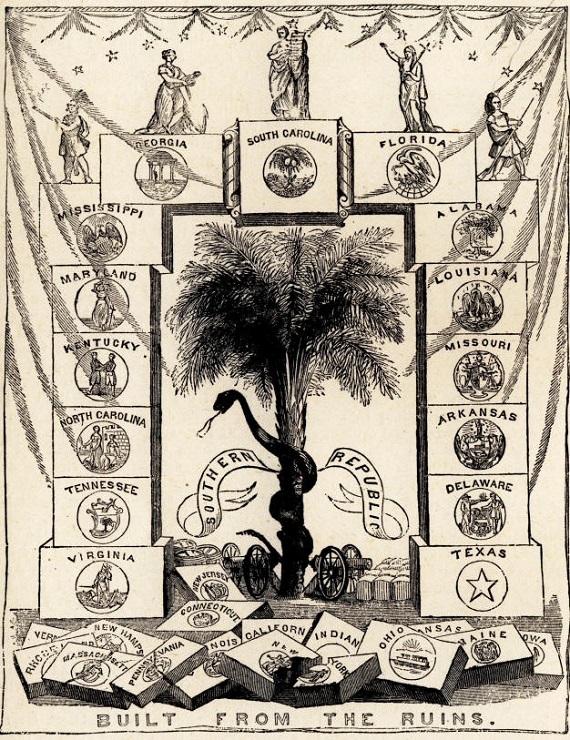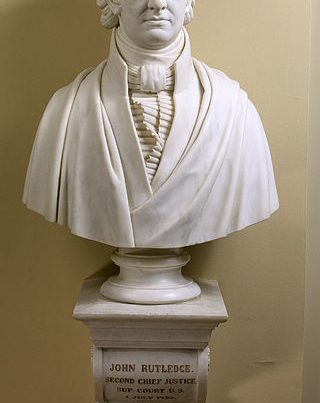
Secession, nullification, and interposition, like the poor, we shall always have with us. These are as American, indeed more American, than apple pie and baseball. Our new federal union, outlined in the Constitution written at the Philadelphia Convention and ratified by the independent states in their separate conventions, was barely out of the gate before the first constitutional crisis hit in 1794. Frustrated by what they construed as Southern obstructionism of the establishment of perpetual public debt and national bank, Senators Rufus King of Massachusetts and Oliver Ellsworth of Connecticut suggested to Senator John Taylor of Virginia that a divorce was in order. Taylor, who had opposed the Constitution, demurred and suggested that compromise on the public debt, which seemed to be the greatest sticking point, was possible. Taylor was right, and the newlywed state stayed married. Nullification and interposition entered the public debate in force with the Virginia and Kentucky Resolutions, whose authors were deeply concerned with president John Adams’s revision and partial repeal of the first amendment to the Constitution. Jefferson’s victory in the election of 1800 settled the affair of Adams’s constitutional transgressions. New England Federalists who railed with all their fury against nullification flirted once more with secession at the Hartford Convention, but then peace broke out in 1814 and they looked rather silly. One can go a hunting for declarations and acts of nullification, large and small, invoked by states or branches of the federal government throughout the antebellum period and find their number is legion. South Carolina nullified the tariffs of 1828, 1832, and the Force Act, President Andrew Jackson and the State of Georgia nullified a treaty with the Cherokee nation and a Supreme Court decision Worcester v. Georgia upholding Cherokee sovereignty. Later, the Commonwealth of Massachusetts decided to nullify the Fugitive Slave Law, after bitterly complaining about everyone else’s nullification habits. In Massachusetts’ defense, slaveholding states were none too happy with Massachusetts’ use of nullification.
What does this all mean for today? Surely all this business about nullification, interposition and secession is so, well, Scarlett O’Hara and Rhett Butler, isn’t it? Of course not. As we speak, several states have interposed their authority to protect the marijuana trade, cities and counties have interposed themselves against federal immigration law by declaring themselves “sanctuary cities.” Meanwhile, other counties, specifically county sheriffs, have interposed their authority or are threatening non-enforcement of state laws gun control laws they believe to be in violation of the second amendment. To misquote that great sage of Ferriday, Jerry Lee Lewis, “There’s a whole lot interpositionin’ goin’ on.” And a good deal of secession talk too, especially in Trump hating California.
Pace dear neo-cons, nationalists, globalists, and other assorted consolidationists from the infernal regions. The citizens of a country born from protest, boycotts, riots, ship burnings, and rebellion is not going to let go of such useful political tools as interposition, nullification, and secession. The very important pragmatic aspects of the American character argue against this well. That is why so much of the hot air over nullification, interposition, and secession comes down to whose ox is getting gored. Sometimes, but not always.
It is the “not always” that interests me. The great “theorists” of nullification, interposition, and secession–let us call them champions of local governance–are a bit different from the run of the mill complainers about gored oxen. Thomas Jefferson, James Madison, John C. Calhoun, John Randolph of Roanoke, and John Taylor of Caroline shared a deep commitment to local governance, to the rule of “live and let live.” Certainly, we can quibble about each man’s depth of commitment, and indeed some of these gentlemen had significant disagreements with each other. The operative word here, however, is gentlemen. In their view, the constitution was meant to function as a gentlemen’s agreement, the basis of which was that the union must be directed to the common good, or if you prefer, the “general welfare.” As such, burdens and benefits were to be shared equally among the states, limits and constraints respected, compromise, or better still, a masterly inactivity was to be pursued in response to any hare brained, ideological, utopian schemes. And most unique of all the American contributions to the political sciences was the view that states were not surrendering their sovereignty to the new federal government, they were delegating certain powers and authority to their agent. Moreover, localities too exercised considerable autonomy as evidenced by the office of sheriff. As officers sworn to uphold the constitution, sheriffs have used their authority to interpose their office between state and federal authorities, and the people of their counties. In the Southern view, be thou an interpositionist, a nullifier, or a secessionist, the basis for your actions were the same: state sovereignty and local governance, and to a degree a live and let live toleration.
Southerners have been accused of using the principles of state sovereignty and local governance as bulwarks to defend against federal assaults on the institutions of slavery and segregation. No doubt, this is true, but critics of the South tend to ignore a few salient points. Southern anger at the nullification of the Fugitive Slave Act by certain northern states hinged on the fact that the constitution explicitly provided for the recovery of fugitive slaves. From a legal standpoint, Massachusetts was not nullifying an unconstitutional law; it was nullifying a provision of the United States Constitution. There is a more important point to be made here. If Massachusetts or California decided to secede tomorrow, their action would elicit yawns and cheers from most Southerners. Though Southern states have not hurried to legalize or decriminalize marijuana, they have not been especially upset about other states doings so, and effectively nullifying federal narcotics laws, or at the very least passively resisting the same.
This Southern attitude of live and let live stands in stark contrast to the sentiments of other citizens of the union. In principle I have no qualms with the secessionists of California, but is their discovery of the right to secede a conversion to the wisdom and prudence of states’ rights, or is it merely pitching a fit over the election of one Donald Trump? Time will tell. New Englander politicians who complained bitterly about what they perceived as the anarchic elements of the Kentucky and Virginia Resolutions had no problem with sailing on the windward side of secession during the Hartford Convention. The consolidationists of the Commonwealth of Massachusetts’ lost their fear of anarchic elements when they nullified the Fugitive Slave Law. Insulating them from anarchy, they believed, was their knowledge of a “higher law,” that justified any means meant to protest, as Massachusetts’ viewed it, grave deviations from the federal government’s mission to transform society. Nullification, interposition, and secession were invoked in the New England polities to further the transformative telos these folk assigned to government, not to make the federal government adhere to the limits assigned to its authority by the states.
The New England telos, however, is a moving target. Greater New England has long since spilled west of the Hudson and extends now to the Left Coast, north of the Ohio River. The old Calvinist faith has been replaced by more secular commitments; the old commitment to perpetual revolution remains. Remaining too is the uniquely Puritan inclination to attribute all good and evil to the action or inaction of government. What the learned Richard Hooker said of the religious Puritans of his day applies also to the secular puritans of our day: they are a people “possessed with dislike and discontentment at things present,” and believe the best remedy is the thing “which they have least tried.”
The great John C. Calhoun viewed nullification as means to preserve the union. If nullification was on the political table, then the rational action would be to forge consensus among contending parties then risk an act of state nullification, or even interposition. Calhoun developed his theory of the concurrent majority with the same end in mind. If sectional vetoes were in place and a real possibility, the incentive to build workable political consensus would overcome the pursuit of merely sectional interest. I am deeply sympathetic to those who argue that so many of the divisive issues and the rancor plaguing American politics could be greatly alleviated by the reassertion of state authority and local governance. In theory, secession (or the threat of secession), nullification, interposition, and non-enforcement are excellent tools to reestablish a politics of civility and live and let live. Yet we are foolish to believe the secular puritans embrace this vision, though they will make use of the tools of state sovereignty and local governance as it suits their purpose. Sectional division is also more complex today. Regional differences do still exist, but these are further complicated by the vast gulf separating the blue, urban archipelago from the sea of rural and small-town red—the modern expression of the perennial conflict between court and country in Anglo-American politics.
Ang Lee’s film, Ride with the Devil, contains a scene that well illustrates what we are up against. Confederate partisans in winter quarters with a private farmer are at supper discussing the events of the day in the borderlands of Missouri and Kansas. Looking back to the first settlements of New Englanders in the region, the host of the partisans points out that the first building erected by the New Englanders was a school house, even before a church. The purpose was simple, “so that everyone should live and think just like them.” Nothing has changed in this regard. Nor is there an endgame for our opponents. No matter the victory they win in the legislatures or courts, there is always another battle to be waged in the service of equality, diversity, empathy, intersectionality, globalism or whatever may be the fashionable abstraction of the day. The war still goes on; the secular puritans and cultural Marxists of the left never sleep; the revolution is always unfinished.
In a more tolerant age, a South Carolina lawmaker speaking to a friend from Pennsylvania summed up the new constituted order framed at Philadelphia and ratified by the states, “You took us with our African slaves, and we took you with your Quakers.” This frank acknowledgement of prejudice and willingness to tolerate the other is no longer present in our politics. The Antifederalists at the Massachusetts ratification convention put forward as one of their chief arguments against ratification the observation that the interests of the different states are too dissimilar to allow for a perpetual Union. This Southern Antifederalist agrees with their assessment. But in a union, we are. The question going forward into time is not if the union should be preserved, but can we bring about its end in a peaceful, fair, and orderly fashion. To not do so courts disaster. The Deep State is already at war within itself, and it does not take a great deal of insight, no matter one’s political inclinations, to see the drift toward civil war in the United States. The question is how may the old principle of ’98 keep us from tumbling into the abyss? If there exists in the union enough people of good will who treasure the principles and practices of local governance and states’ rights, then there is hope for an orderly withdrawal from the great, but failed experiment begun at the Philadelphia Convention in 1789. If not, then we may well see a terrible civil war that is nothing more than a contest for raw power and dominion.
This essay was originally published at Reckonin.com.






